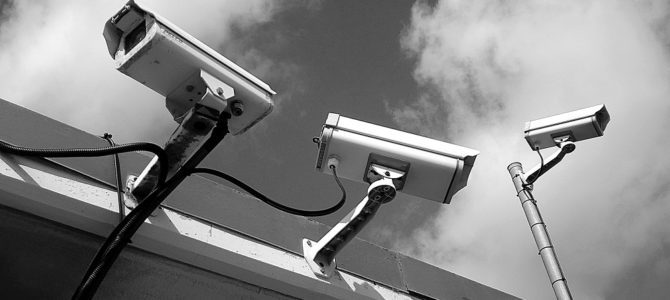
The Cambridge Analytica/Facebook scandal continues to be front-page news. According to current reports, Cambridge Analytica obtained private Facebook data, which it used to send pro-Trump material to targeted Facebook users. These reports have met outrage in Washington DC. The Federal Trade Commission has opened an investigation, and U.S. senators have called for Mark Zuckerberg, the Facebook CEO, to testify in front of Congress.
Calls by Congress for increased oversight to prevent private companies from surveilling people are extremely ironic given that they recently renewed a section of the 2008 Foreign Intelligence Surveillance Act, which allows for the warrantless surveillance of Americans. Issues regarding the appropriate use of government surveillance are also at the center of special counsel Robert Mueller’s investigation into the Trump administration.
These headlines provide an excellent opportunity to consider the history of the U.S. government’s surveillance state, which matters for people across the world whose liberties are at stake as government power expands.
Surveillance Origins: To Squash Dissent
The origins of the present-day surveillance state can be traced back to the U.S. government’s military occupation of the Philippines in the late 1890s. Under the leadership of Ralph Van Deman, who would earn the informal honorific of “father of U.S. military intelligence,” the U.S. occupiers established a state-of-the-art surveillance apparatus to squash dissent by those who resisted U.S. efforts.
After his time abroad, Van Deman returned home and, drawing upon his experiences abroad, worked tirelessly to establish similar surveillance infrastructure at home. In May 1917, the Military Intelligence Section (MIS) was formed, with Van Deman at the helm.
Over the following decades, the U.S. surveillance state continued to expand and reorganize, resulting in the founding of the National Security Agency (NSA) in 1952. This coincided with an unprecedented expansion in the scope of government surveillance of the daily lives and activities of American persons. The prevalence of unconstrained government surveillance is evident in the four main concurrent operations undertaken at that time: Project SHAMROCK and Project MINARET, both operated by the NSA; COINTELPRO, implemented by the Federal Bureau of Investigation; and Operation CHAOS, which fell under the purview of the Central Intelligence Agency (CIA).
These programs monitored all foreign telegraphs passing through the United States and surveilled individuals the FBI deemed “subversive,” which included civil rights leaders and anti-war protestors, among many others. This included not just indirect monitoring, but also infiltrating private organizations and illegal burglary in the name of protecting against “domestic dissent.”
Attempts at Restraint Turn Into License for More
The success of Van Deman’s vision and influence emerged in the 1970s, when the scale and scope of the national surveillance state, and the American government’s abuse of the power derived from controlling that machinery, were publicly revealed due to the reporting of Seymour Hersh. The subsequent investigation by the Church Committee revealed the extent of the abuses by U.S. intelligence operations, noting that “virtually every element of our society has been subjected to excessive government-ordered intelligence inquiries.” The committee’s findings made clear that the unchecked surveillance apparatus had unleashed an unconstrained leviathan that undermined the liberty of the American people.
In response to the committee’s findings, Congress passed the Foreign Intelligence Surveillance Act (FISA) of 1978, which was intended to oversee and place judicial constraints on the government’s surveillance activities. The act created the secret Foreign Intelligence Surveillance Court (FISC). However, as the revelations by Edward Snowden in 2013 made clear, these reforms were ineffective, with the members of the security state acting with few if any real constraints on their behavior.
It is crucial to understand the origins of the U.S. surveillance state both as an important historical episode, but also because it highlights a broader point: a militaristic foreign policy has real effects on domestic institutions and poses a genuine threat to domestic liberties. Many Americans believe overseas interventions by the U.S. government protect domestic liberties and promote freedom.
In our book, “Tyranny Comes Home,” we argue that this view is incomplete, if not entirely mistaken. When a society adopts the values of an aggressive empire, it runs the risk of adopting imperial characteristics at home.
Let’s Discuss the Boomerang Effect
To explain why, we develop a theory of the “boomerang effect” to understand the process through which intervention abroad increases the scope of government power at home and erodes citizens’ liberties. Preparing for and engaging in foreign intervention provides a testing ground for intervening governments to experiment with new forms of social control over distant populations. Under certain conditions, these innovations in social control are then imported back to the intervening country, expanding the scope of domestic government activities.
The result is that the intervening government becomes more effective at controlling not only foreign populations but the domestic population as well. Under this scenario, preparing and executing foreign intervention changes domestic political institutions and the relationship between citizen and government. Domestic freedom from others’ interference and coercion is eroded or lost altogether as the state gains power over citizens.
The thriving U.S. surveillance state clearly illustrates the logic of the boomerang effect. The centralized apparatus of social control that the U.S. government first developed in the Philippines in the late nineteenth century has boomeranged to the United States, where it is flourishing more than a century later. As we discuss in “Tyranny Comes Home,” the boomerang effect also offers important insights into other cases, including the militarization of police, the domestic use of drones, and torture in U.S. prisons. Ongoing foreign military interventions with no end in sight will certainly lead to increased government power at home in the future.
Members of the U.S. government often use the rhetoric of freedom and virtue to legitimize intervention. This supposed commitment to higher ideals is indicated by the names assigned to the government’s actions, such as “Operation Just Cause,” “Operation Enduring Freedom,” “Operation Iraqi Freedom,” “Operation Valiant Guardian,” and “Operation Falcon Freedom.” Despite this lofty rhetoric, the pernicious boomerang effect continues to operate: preparing for and carrying out intervention abroad undermines freedom at home.
It is crucial for Americans to realize this unseen and overlooked cost of a militarist foreign policy before it is too late and their liberties are forever lost.
This article originally appeared on the Stanford University Press blog.









